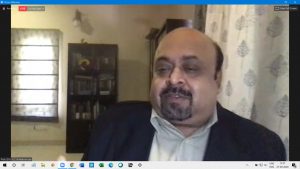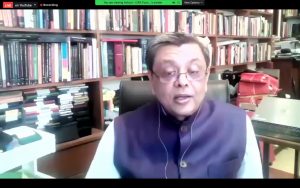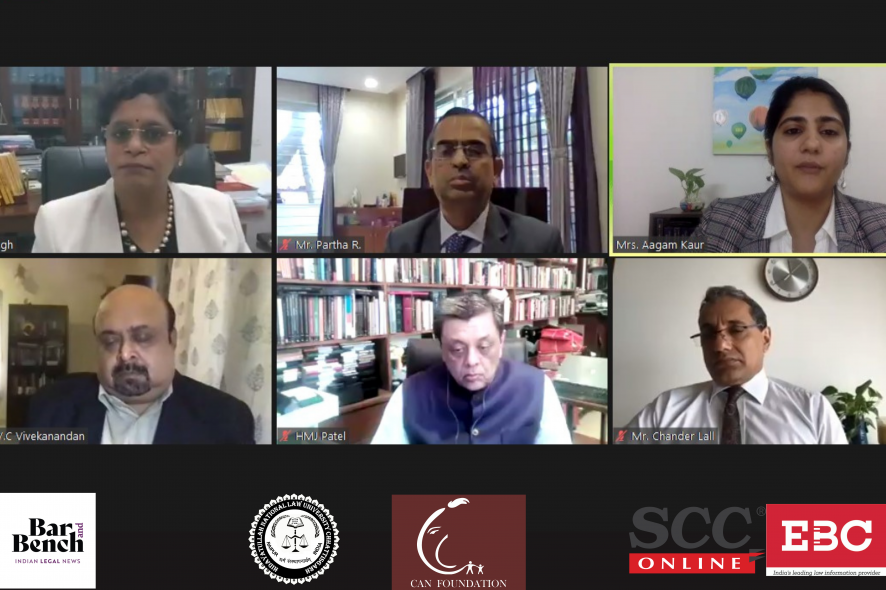The Sunday Morning saw some of the most respected names in Intellectual Property Law joining in to discuss one of the most hotly debated topics of the current times. The subject under consideration was “Internet Infringement Impacts: Transborder Reputation & Jurisdictional Issues in IPR”.
The illustrious panel hosted by the Hidayatullah National Law University Raipur in collaboration with Confederation of Alumni of National Law Universities (CAN) Foundation saw Mr. Justice Gautam S. Patel, Judge, Bombay High Court; Ms. Justice Prathiba M. Singh, Judge Delhi High Court and Prof. (Dr.) V.C. Vivekanandan, Vice-Chancellor, HNLU, Raipur. The session was moderated by eminent personalities Mr. Chander Lall, Senior Advocate Delhi High Court & Supreme Court of India along with Mr. Parthasarthy R., Principal Partner (Head – IPR Division) Lakshmikumaran & Sridharan Attorneys. Mrs. Aagam Kaur hosted everyone one behalf of the foundation.

The Session started with brief yet glorious introductions of the panelists and moderators. The Respected Vice-Chancellor was called on the mic. He delivered a most succinct welcome address highlighting the importance of the topic being discussed. He remarked that it was a very interesting area, the importance of which we all were witness for the last 6 months, being all on the internet and it had become a very thick area of passionate discussion. Speaking on the paradigm shift that the internet has been in the civilizational discourse of mankind, he remarked, “If we look at it, technology is part of the human race from the beginning; it has always been with the human race, call it as from flint stones to genetic clones; it is again in the travel of technology. If you look at the issue of technology and how humans are connected; but what makes the internet special is simple that it is paradigm shift, it was not an acceleration as like other technologies did, but it is a paradigm shift in the sense that it moves so fast”.
Upon the travails of classroom teaching he mentioned, “I always tell this technology can be a product of a brilliant mind on a single day whereas, law is something which we all agree in classrooms to, it’s often a product of collective frustration.” He further highlighted the gap that existed in terms of technology and how law approached it by remarking, “We are living with 19th century legal structure, 20th century governing processes and 21st century technologies”.
Prof. Vivekanandan was full of praises for the Foundation and rather cheekily remarked, “I do sometimes feel as a Vice-Chancellor of HNLU that the Vice-Chancellors of NLU’s pick the same spirit what the Alumni are doing; please don’t read in between the lines; I’m just saying that sometimes it’s good to learn from Eklavyas. In that way CAN Foundation has been doing a great job and I’m happy to be part of this.”

The Session was divided into two broad parts, one being the Transborder Reputation Issues & the other pertaining to jurisdictional issues.
Justice G.S. Patel began his address by remembering Late Prof. Shamnad Basheer and his notable contributions to the field of IPR. He noted Prof. Basheer’s monumental commitment towards legal education through Spicy IP blog and IDIA. He reiterated his commitment to help IDIA scholars by promising them the royalties to his next work and also planning on a judicial internships scheme for the scholars.

Upon the topic, Justice Patel viewed that the issue of “Transborder Reputation” is not just international but also how the traditional body of law has gained relevance. Further, he remarked upon virtual court hearings and threw some light as to how the internet has wide ranging ramifications upon different areas of law. He said “the internet has demolished the Berlin walls the world over”. Brands are now recognized in the virtual world without them being a brick and mortar business in jurisdictions.
Apart from a number of questions lying before the Judiciary, the central one is the question of reciprocity in the context of Transborder reputation of the international entities.
Citing Delhi High Court’s 2001 judgement in Playboy Enterprises, Inc. vs Bharat Malik (2009 SCC OnLine Del 991). He asserted that the Indian courts have recognized Transborder reputation of internationally trading entities. At the same time, he questioned, whether our overseas counterparts have fulfilled their duty to recognize our internationally trading brands?
Today majority of the brands market their goods through web presence, without establishing any brick-mortar outlets. These developments highlight the need of recognition of Transborder reputation.He also mentioned the case of Hardie Trading Ltd. vs Addisons Paint and Chemicals Ltd (2003) 11 SCC 92.
Justice Pratibha Singh initiated her address by remembering late Justice Ruth Bader Ginsburg and her contribution to the field of IP. Justice Singh agreed with Justice Patel that the internet has broken the local barriers through its online presence.
Remarking upon the increasing international presence of marketers though internet, she highlighted the problems faced by Indian proprietors while protecting their brands in international market through Trademark. She gave an example of the US Trademark office which asks for the address of the business in the US. Unless there is a presence in the US, no company could get trademark there. In these circumstances, the laws in US makes it very difficult for the companies established abroad to get themselves registered and protected.
Similar is the case when it comes to the enforcement and protection of the mark in US and UK. From Budweiser decision of US from 1980s to Starbucks decision of UK from 2015 and Bukhara judgment in US, all these decisions of US and UK courts have time and again reemphasized the territorial nature of the trademark rights. In Bukhara case in the US, it was held that it is unclear whether foreign well-known marks can be recognized. In Budweiser case and the Starbucks case in the UK, a similar stance was taken up by the judges.
Whereas in India, in light of the concept of well-known marks, Delhi High Court in Apple case (2016 SCC OnLine Del 2196) and Whirlpool case (1994 SCC OnLine Del 654), Bombay High Court in Gillette case (1986 SCC OnLine Bom 350) and many other judgments have recognized Transborder Reputation with mere online and advertising presence. She lauded the flexible stand taken up by Indian courts while recognizing the international brands and protecting them against any unethical infringement. The biblical context of thou shalt not see can be observed in well-known marks.
IN India, we have extended the concept dynamic injunctions, to grant injunctions against Flipkart, McDonalds, etc. India has implemented Art. 6 of Paris Convention, Art 16(2) of TRIPS agreement.
In her address, Justice Singh questioned whether our Indian brands get equal protection in the international markets as provided by Indian authorities to the foreign brands not established in Indian Territory.
Justice Patel summarized the topic at hand by citing Para 41 of the Hardie case and explained the statutory meaning of the ‘use’ of the goods having trademark and limitations.
He further went on to comment about IP colonialism or imperialism, he said, “Our Indian brands do not get necessary recognition overseas but a system developed where we do recognize foreign brands.” To drive the point home, he further cited the Starbucks case to avoid over-protectionism, to strike a balance between protectionism and competition. He strongly reiterated that Indian brands need the same respect when they are on international platforms.
The session further continued on the jurisdictional issues surrounding IPRs.
The whole session can be viewed at: HERE






